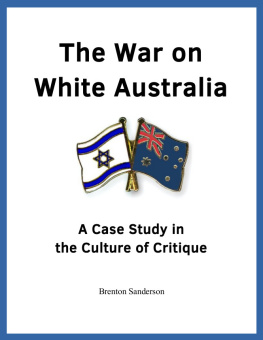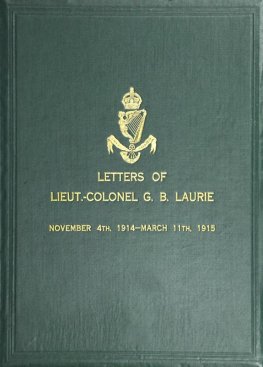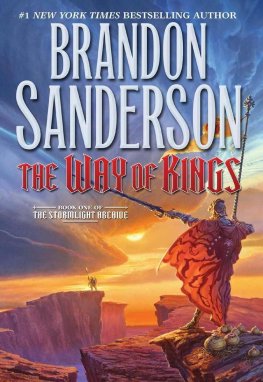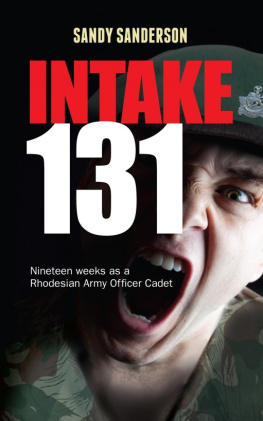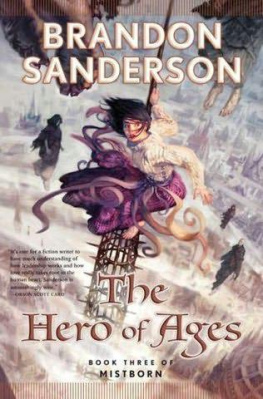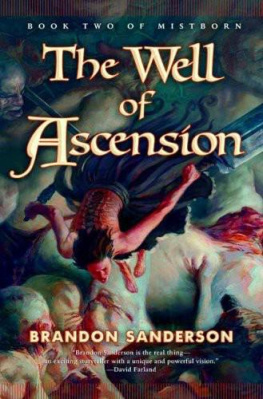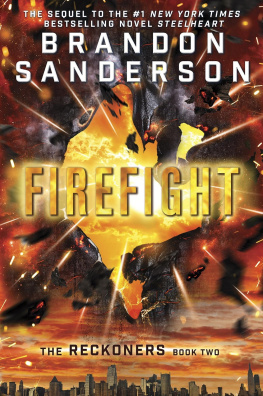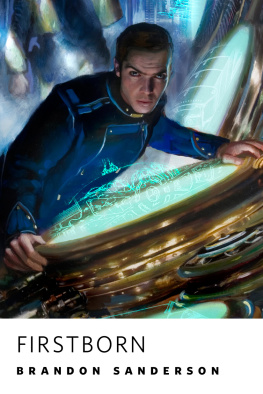Brenton Sanderson began writing for The Occidental Observer and The Occidental Quarterly in 2011. I have been an enthusiastic supporter of his work from the beginning his first essays were on the War on White Australia which I am happy to learn will be coming out in a separate, much anticipated, volume.
As an editor, one quickly learns to appreciate essays that are well-researched and well-written, and Sandersons work has always been up to the highest standard. Each of these essays is a gem. The general theme of Battle Lines is the difficult question of Jewish influence difficult at least partly because the literature is littered with apologetic writings, so that getting a firm grasp on such a topic requires great persistence and honesty. As he writes in the Introduction, The Jewish Question is foundational to the demographic transformation of the West, the revolution in its sexual and ethical mores, and to the trajectory of Western politics, art and culture. We cant avoid talking about it if we want to be honest about what is happening. But doing so is a thankless task, a reason for being scorned and ostracized, fired from ones job, barred from influential positions in the media and academic world. Sanderson quotes Richard Wagner writing in the nineteenth century, It is distressing to me always to come back to the theme of the Jews. But one cannot escape it if one looks to the future.
And 150 years after Wagners statement, it is still absolutely true. We simply cant avoid discussing the Jews. Honest discussions of Jewish influence are absolutely necessary if White people are going to have a future.
Much of Sandersons work has been on Jewish influence on culture, particularly in the arts and the media. These are major contributions. Beginning in the early twentieth century Jews have had enormous influence on the visual arts as artists, critics, dealers, and collectors. In 1973 Sophy Burnham published The Art Crowd , estimating that 80 per cent of the 2,500 core art market personnel dealers, curators, gallery owners, collectors, critics, consultants and patrons of the arts were Jewish. 1
So its not surprising that Jewish attitudes would be reflected in what counts as fine art and whose work gets promoted. As Sanderson notes in his essay on Tristan Tzara and the Dada movement, there was a Jewish intellectual substructure of many of these twentieth century art movements manifest in their unfailing hostility toward the political, cultural and religious traditions of Europe and European-derived societies.
Given this reality, it is not difficult to envision Jewish critics championing Jewish artists or non-Jews like Jackson Pollock whose work can be seen as advancing this hostility toward the culture of the West. Nor is it difficult to imagine Jewish art dealers promoting such artists (e.g., Sidney Janis promoting Mark Rothko [Chapter 9] whose fame had nothing to do with any recognizable talent but was inextricably linked to his being a member of a Jewish sub-culture). The same goes for Jewish art museum curators (e.g., Katherine Kuh promoting Rothko), Jewish collectors (e.g., Charles Saatchi promoting Damien Hirst), and Jewish critics (Clement Greenberg promoting Jackson Pollock).
Gustav Mahler and Leonard Bernstein were doubtless very talented musicians and composers. However, their elevation to the status of cultural icons cannot be explained by talent alone. Once again Sanderson documents a coterie of Jews promoting these figures, including Bernstein promoting Mahler. Bernstein in particular has always fascinated me because of his flamboyant personality and style. Sanderson notes that his fame rivaled that of Elvis Presley or Marilyn Monroe. Even I, who was not particularly drawn to classical music at the time, was quite aware of him and recall being struck by his impassioned performances as a conductor. The issue of Jewish personality is relatively unexplored, but it seems that Jews often have extreme personalities personalities that make people stand out in whatever their field of endeavor, with Bernstein being a prime example. In my first book on Jews, A People That Shall Dwell Alone , I summarized data indicating that, on average, Jews rated highly on all the personality systems.
And while Jews have been able to promote certain individuals to the status of cultural icon, they have also attempted to tear down others, Richard Wagner being the most prominent example. In the case of Wagner, his towering musical genius presents a major obstacle in this endeavor, but there can be little doubt that there has been a campaign against Wagner waged by Jewish music critics and producers. Sanderson provides an amazing quote from Bernstein, I hate Wagner, but I hate him on my knees a grudging acknowledgement of the scale of German composers achievement. Despite his prodigious talent, Wagner is now routinely labeled a deeply pathological personality a common description by Jews eagerly seeking out any flaw in a person they dislike for deeper reasons. The result has been that performances of Wagnerian works like The Ring in the modern era have invariably sought to satirize the drama to subvert the message Wagner attempts to convey. If they cant ban him outright because the music is too powerful, they can nip at the edges with satire and false messaging.
Another aspect of Jewish influence on culture has been the sexual revolution. In writing The Culture of Critique I always thought of the chapter on Freud as pivotal for understanding what had happened since the 1960s. Freuds war on sexual and family mores has had vastly more devastating effects on people at the lower end of the IQ distribution than the solidly middle class or upper class. Those at the lower end of the IQ distribution benefit more from the social supports embedded in religion and traditional culture, but these have essentially been destroyed since the 1960s. Since then, all the markers of family function have declined precipitously, including increases in divorce, lower rates of marriage, births out of wedlock, and single parenting all of which are linked to negative effects on children and all more common in people of lower socioeconomic status. In recent decades this has been exacerbated by drug abuse, especially opioid abuse, which is again more common among people on the lower rungs of society.
Here Sanderson emphasizes how the ongoing sexual revolution, originated by a vastly disproportionate number of Jewish intellectuals, has filtered into the entertainment industry, focusing on the work of Jenji Kohan ( Orange is the New Black ) and Jill Soloway ( Transparent) . When I was growing up in the 1950s, religious and patriotic groups exercised significant power over the content of movies and television. Marriage and having children were generally depicted as rewarding life choices, and all the psychological research indicates that traditional married families are indeed more likely to result in well-adjusted children.
However, such families are a vanishing breed in the Western media landscape, replaced by shows presenting divorced families, single parenting, and homosexual and transgender relationships as normal and fulfilling. Both Kohan and Soloway are strongly identified Jews (Kohan wanted to become a rabbi and Soloway said that Jews in Hollywood are recreating culture to defend ourselves post-Holocaust). Their careers have taken place completely within a Jewish milieu a good indication of the fundamentally Jewish nature of the entertainment industry. A non-Jew wishing to have a career in the industry could not possibly produce, write, or direct anything that offends Jewish sensibilities.



